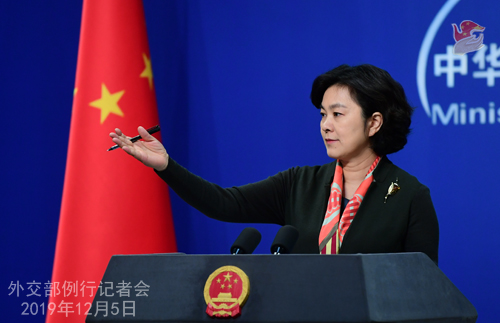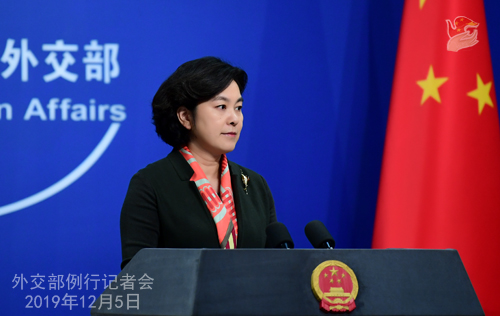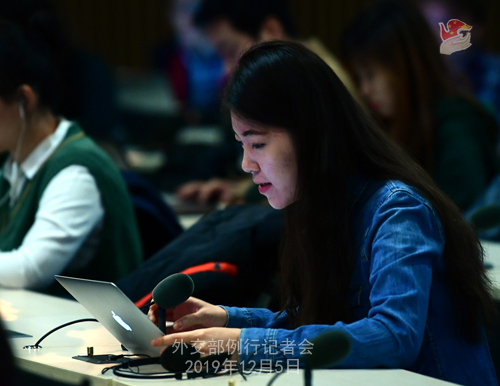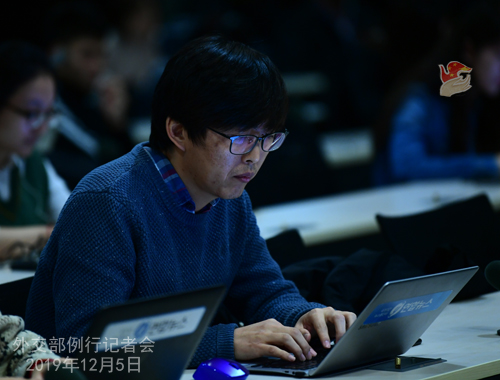| Foreign Ministry Spokesperson Hua Chunying's Regular Press Conference on December 5, 2019 |
| 2019-12-05 18:14 |
|
At the invitation of Yang Jiechi, member of the Political Bureau of the CPC Central Committee and Director of the Office of the Foreign Affairs Commission of the CPC Central Committee, Shigeru Kitamura, head of the National Security Council of Japan, will visit China from December 5 to 7. The two sides will hold a new round of China-Japan high-level political dialogue to exchange views on bilateral relations and major issues of common concern. At the invitation of Daw Aung San Suu Kyi, State Counsellor and Union Minister for Foreign Affairs of Myanmar, State Councilor and Foreign Minister Wang Yi will visit Myanmar from December 7 to 8. Q: Despite US officials' efforts to lobby and pressure European countries to identify China as a threat during the NATO summit, the London Declaration issued on November 4 didn't do so. NATO diplomats said that most Europeans know this does not represent their national interests. NATO recognizes that China is a rising power, but it doesn't mean China is the new enemy. What's your comment? A: Whether one poses a threat or not has nothing to do with size. It is true that China is a big country with growing influence. But we are committed to peaceful development, see the whole world as one family, believe in harmony without uniformity, and uphold equality and mutual respect. A growing China is therefore a growing force for peace, fairness and justice. We also noted that within NATO, there are objective and rational voices saying China is not an enemy. As a matter of fact, the greatest threat and challenge the world faces is unilateralism and bullying practices. There is no immunity even for US allies. Q: Spokesperson of the US Department of State said in a statement on December 4 that allowing Chinese telecommunications firms such as Huawei and ZTE anywhere in a country's 5G networks would present critical risks to the privacy, human rights, and security of its citizens. The United States urges all countries, including partners and allies, to adopt national security policies that would prevent untrusted vendors from accessing any part of their future 5G networks. What's your comment? A: The US keeps talking about security. But I wonder, what are the criteria for security? Who is to decide and judge that? If a person is both the athlete and the referee -- more than often a crooked referee -- in a match, how can this person be trusted and how can this match be fair? The so-called "security trap" cooked up by the US sounds very serious, but actually it is nothing but absurdity. If the US logic stands, everything made in China is dangerous. Then are Americans to stop wearing shoes and clothes made in China, for they, too, may pose a security threat? Not long ago, former Microsoft CEO Bill Gates made an interesting analogy at an open event to show the absurd logic behind the belief that everything from China is bad. He said that China bought Boeing aircraft, and coming with that is a large amount of US software. If the US logic stands, shouldn't the Chinese government be vigilant to American directives to shut the engines? Were that true, who dares to buy US-made aircraft, automobiles or any other electronic products? I made a thorough statement the other day on this issue. After years of review, the British government, German's Federal Office for Information Security and the European Commission all failed to detect any obvious backdoor in Huawei. However, security loopholes have been spotted in several prominent US companies, including Cisco and Apple, with many backdoor cases revealed. The infamous PRISM program has shown that even leaders and citizens of allies of the US have no privacy in front of its powerful global surveillance and wiretapping system. Huawei has stated its readiness to sign no-backdoor agreement and to receive third-party test and supervision. Can the US make the same pledge? We hope and believe relevant countries will make independent judgment based on their long-term interests and adhere to the principle of justice, fairness and non-discrimination. I'm sure they are wise enough to skip the "security trap" cooked up by the US.
Q: The US announced on December 2 the immediate resumption of tariffs on steel and aluminum imports from Brazil and Argentina. The USTR's office issued a statement that night saying it plans to impose up to 100 percent tariffs on French imports worth 2.4 billion US dollars. Reports also say the US is exploring whether to launch investigations on Austria, Italy and Turkey regarding digital tax. I wonder if China has a comment? A: I have noted that France, Brazil and Argentina have all made responses. I have also noticed that the US tariff barrage has sent jitters through global financial markets, with European and US stock markets registering their biggest losses in two months. This is further testimony that the US unilateralism, protectionism and trade bullying practices are a threat to international trade order and to all countries. It also points to the relevance and urgency of joint efforts to safeguard the free trade regime. Q: On 3 December, the 74th Session of the UN General Assembly convened a plenary session to consider the question of Palestine and the situation in the Middle East. Many representatives including China's permanent representative to the UN made statements on the Middle East issue. Could you offer more information? A: China is Palestinian people's sincere good friend, partner and brother and a firm supporter for peace between Palestine and Israel. We are deeply concerned about the continuing turmoil and stand for full, just and lasting resolution of the question of Palestine through political negotiation to realize the peaceful coexistence and common development of Palestine and Israel. China calls on all parties to remain calm and exercise restraint to avoid intensifying confrontations and conflicts, and to remain committed to rebuilding and consolidating mutual trust so as to create favorable conditions for the relaunching of peace talks between Palestine and Israel. We believe that relevant UN resolutions and principles including the "two-state solution", "land for peace" are bottom lines for fairness and justice that must be adhered to. China feels deeply for the suffering of the Palestinian people and has been working actively to promote peace in the Middle East. At the recent Middle East Security Forum hosted by China, State Councilor and Foreign Minister Wang Yi elaborated on a well-received Chinese proposal for the security issues in the Middle East, namely staying committed to the correct direction of a political settlement, defending the basic principles of fairness and justice, leveraging the key role of the United Nations, and forging synergy in the region and the international community. Recently, Special Envoy of the Chinese Government on the Middle East Issue Zhai Jun also visited countries in the region in search of a solution accommodating all parties' interests. We believe that justice may be delayed, but it will come. China will continue to firmly support the just cause of the Palestinian people to restore their legitimate national rights, and work tirelessly to safeguard fairness and justice, and maintain regional peace and stability.
Q: Could you brief us on the outcomes of State Councilor Wang Yi's visit to the ROK? Reports say the two sides are in discussion for Chinese leader's visit in the first half of next year. Can you confirm that? A: State Councilor Wang Yi is now on a visit to the ROK. It is an important strategic communication between our two countries. The two foreign ministers held talks yesterday. State Councilor Wang Yi emphasized that the biggest threat to world peace and stability today is unilateralism and bullying acts, which undermine the existing international order and challenge the norms governing international relations. China always pursues an independent foreign policy of peace, advocates equality between big and small nations, promotes democracy in international relations, opposes the practice of the big and strong bullying the small and weak, the imposition of one's own will on others and interference in other countries' internal affairs. China is willing to work with all responsible countries, including the ROK, to uphold multilateralism and the principle of fairness and justice, maintain the international system with the UN at its core, the international order based on international law, and the multilateral trading system with the WTO as foundation. The two sides agreed to plan important high-level exchanges in the next stage and strengthen the strategic communication and cooperation between the two countries. They agreed to better synergize the Belt and Road Initiative and the ROK's development strategy and had positive discussion of advancing third-party cooperation. They applauded the launching of the formulation of the development plan 2021-2025 on China-ROK economic and trade cooperation, agreed to accelerate the second-phase negotiation process of the China-ROK free trade agreement, and build an upgraded version of trade cooperation. The two sides decided to establish a new bilateral maritime affairs dialogue and cooperation mechanism. Both sides agreed to remain committed to multilateralism, free trade and building an open world economy. Both commended the conclusion of the negotiations on Regional Comprehensive Economic Partnership (RCEP) and expressed readiness to work with others to ensure the official signing of the deal next year. The two sides also agreed to follow their consensus to properly handle the THAAD issue that affects the healthy development of China-ROK relations and respect each other's core interests and legitimate concerns. The two sides looked back on how the situation on the Korean Peninsula evolved since last year and agreed to advance the political settlement of the Peninsula issue in accordance with the dual-track approach. China believes that the important consensus reached at the DPRK-US summit in Singapore should be put into effective implementation. The DPRK's legitimate concerns in security and development should be valued and addressed. The Security Council should take concrete actions to begin discussing invoking relevant resolution provisions to modify and ease sanctions on the DPRK so as to encourage all parties to move forward in the course of political settlement. As to the high-level visit you asked about, as I understand, the two sides agreed to stay in close communication on high-level interaction going forward. We will release information once we have it. Q: Recently the US has taken actions against China on issues relating to Hong Kong and Xinjiang. It also said there is no rush to reach a trade deal, leading to decline in US stock markets on December 3. Besides, according to a recent report from the American Farm Bureau Federation (AFBF), 580 farms filed for bankruptcy between September 2018 and September 2019, which is a 24-percent increase from the previous 12-month period. In nine American states, farm bankruptcy filings were the highest in a decade. AFBF President Zippy Duvall said that the longer consultations take, the harder it will be for American farmers to get back market shares in China. Do you have a response? A: We already stated that a trade war harms others and oneself. At the end of the day, American people's interests will be undermined. Only a mutually-beneficial deal on the basis of equality and mutual respect will serve the interests of the Chinese and American people. It is also what the international community hopes to see.
Q: Secretary Patrushev of the Security Council of the Russian Federation is now in China to co-chair the 15th round of China-Russia strategic security consultation with Director Yang Jiechi. Analysts say China and Russia have apparently strengthened strategic coordination lately. I wonder if you could comment on that? A: Unilateralism and bullying practices are having a severe impact on international order. Some country even blatantly interferes in other countries' internal affairs and undermines their sovereignty, security and development interests. As permanent members of the UN Security Council as well as comprehensive and strategic partners of coordination for a new era, China and Russia will of course enhance communication in strategic security, step up mutual strategic trust, safeguard respective core interests and common security, and play our due role to uphold security, peace, stability and beyond. On December 2, President Xi Jinping met with Secretary Patrushev. Yesterday in Shanghai, Mr. Patrushev co-chaired the 15th round of China-Russia strategic security consultation with Yang Jiechi, member of the Political Bureau of the Communist Party of China (CPC) Central Committee and Director of the Office of the Foreign Affairs Commission of the CPC Central Committee. Both sides had in-depth exchange and reached broad consensus on China-Russia relations in a new era, international affairs and multilateral coordination. They agreed to conduct closer strategic coordination, oppose foreign intervention, support each other's core interests and defend domestic political security and security of social system. We will openly reject unilateralism and bullying practices and uphold peace, security and stability. Under the current circumstances, closer strategic coordination between China and Russia will only bring positive energy to international strategic security and stability. Q: China and the DPRK held the 13th round of consular consultation on December 3 in Beijing. Did you discuss the repatriation of DPRK workers as required by UN Security Council resolutions? As there are still many DPRK workers in China, what measures will you take? A: China has been earnestly implementing relevant Security Council resolutions and fulfilling international obligations. We will deal with the issues in accordance with relevant UNSCR provisions.
|
|
||||||||||
 |
||||||||||
|
| ||||||||||
|
| ||||||||||
 | ||||||||||
 | ||||||||||
 |
| Home > Spokesperson's Remarks | |||
|
|
|||
|
| |||





